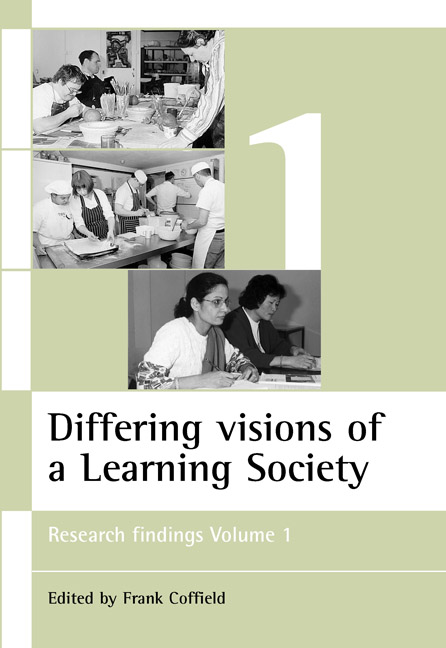Book contents
- Frontmatter
- Contents
- Notes on contributors
- Introduction: A critical analysis of the concept of a learning society
- one ‘Worlds apart’ – Education markets in the post-16 sector of one urban locale 1995-98
- two Unifying academic and vocational learning in England, Wales and Scotland
- three Skill development in higher education and employment
- four The variable contribution of guidance services in different types of learning societies
- five Changing patterns of training provision in the National Health Service: an overview
- six Working and learning in Britain and Germany: findings of a regional study
- seven Development of knowledge and skills at work
- Index
Introduction: A critical analysis of the concept of a learning society
Published online by Cambridge University Press: 05 July 2022
- Frontmatter
- Contents
- Notes on contributors
- Introduction: A critical analysis of the concept of a learning society
- one ‘Worlds apart’ – Education markets in the post-16 sector of one urban locale 1995-98
- two Unifying academic and vocational learning in England, Wales and Scotland
- three Skill development in higher education and employment
- four The variable contribution of guidance services in different types of learning societies
- five Changing patterns of training provision in the National Health Service: an overview
- six Working and learning in Britain and Germany: findings of a regional study
- seven Development of knowledge and skills at work
- Index
Summary
The findings from the Economic and Social Research Council's (ESRC) programme of research into ‘the learning society’ are presented in two volumes, of which this is the first; and they appear at a most opportune time because the Secretary of State for Education and Employment in England recently raised for discussion issues of vital importance to all democratic societies, namely, how can research evidence be used more effectively in the development and implementation of government policy? And, more generally, what should be the relationship between government and the research community? In essence David Blunkett has issued three challenges to all social science researchers, each of which The Learning Society Programme is prepared to be judged by:
• to study issues “central and directly relevant to the political and policy debate”;
• to “take into account the reality of many people's lives”;
• and to engage open-mindedly with policy rather than be “driven by ideology paraded as intellectual inquiry or critique” (Blunkett, 2000, p 2).
A quick glance at the titles in the table of contents of the seven chapters which follow will reveal that the topics chosen for study amply fulfil the first two criteria laid down by the Secretary of State. Whether the third challenge has also been met is left to the judgement of the reader, but programmes of research have the advantage over ‘stand-alone’ projects of developing a measure of internal quality control through discussing and debating emergent findings and policy implications.
In the two volumes of findings from The Learning Society Programme researchers produce new findings in areas where evidence has been particularly thin (for example skill levels at work); they develop new and useful concepts (such as social capital); they criticise current orthodoxies (the over-reliance on human capital); they analyse the success of approaches which re-engage traditional non-participants in learning (credit-based learning); they re-assess the significance of forms of learning (such as informal learning) which are currently being unduly neglected; they identify significant gaps in our knowledge (social theories of learning); they develop research methods (a new, interdisciplinary approach to the analysis of skills at work); they examine weaknesses and contradictions in existing policies (learning markets); and they make detailed suggestions for the improvement of these policies (which will be summarised in the second companion volume – see Coffield, 2000: forthcoming).
- Type
- Chapter
- Information
- Differing visions of a Learning Society Vol 1Research Findings, pp. 1 - 38Publisher: Bristol University PressPrint publication year: 2000
- 1
- Cited by

